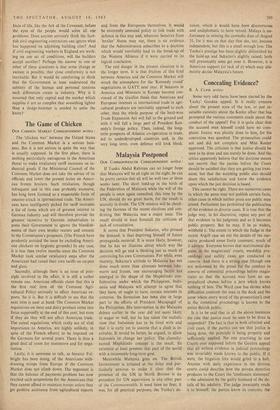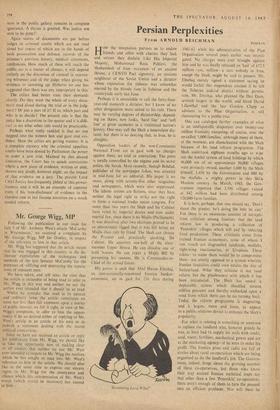Concealing Evidence?
R. A. CLINE writes: Some very odd hares have been started by the 'Lucky' Gordon appeal. Is it really concern about the present state of the law, or just in- satiable curiosity about the Keeler affair that has prompted the various comments made about the conduct of the appeal? For it is quite clear that the accused man himself could have no com- plaint. Justice was plainly done to him, for his conviction was quashed. The prosecution could not and did not complain and Miss Keeler approved. The criticism is that justice should be seen to be done and not merely be done. And the critics apparently believe that the doctrine means not merely that the parties before the Court should be satisfied that they are getting just treat- ment, but that the watching public also should share this satisfaction and know the evidence upon which the just decision is based.
This cannot be right. There are numerous cases in which the press may not publish certain facts, other cases in which neither press nor public may attend. Parliament has prohibited the publication of the evidence in divorce cases. It is true that the judge may, in his discretion, repeat any part of that evidence in his judgment and so it becomes public property. But he may, if he so wishes, withhold it. The extent to which the Judge in the recent Argyll case set out the details of the nar- rative produced some lively comment, much 'of it adverse. Everyone knows that matrimonial dis- putes in the magistrates' courts, wardship pro- ceedings and nullity cases are conducted in camera. And there is a strong case (though one not welcomed by the press) for the conduct in camera of committal proceedings before magis- trates so that the accused may have an un- prejudiced chance before a jury which knows nothing of him. The Ward case has shown what difficulties confront the man in the dock and the juror where every word of the prosecution's case in the committal proceedings is known to the entire British public.
Is it to be said that in all the above instances the rule that justice must be seen to be done is suspended? The fact is that in both criminal and civil cases, if the parties can see that justice is being done, the principle is being properly and sufficiently applied. No one practising' in our Courts ever supposed before the Gordon appeal that all written evidence in judicial proceedings was invariably made known to the public. If it were, the litigation lists would grind to a halt. Anyone. with daily experience in the divorce courts could describe how the private detective produces to the Court the 'confession statement' —the admission by the guilty husband of the de- tails of his adultery. The judge invariably reads it to himself; the parties know its contents; the
man in the public gallery remains in complete ignorance. A decree is granted. Was justice not seen to be done?
Again scores of documents are put before judges in criminal courts which are not read Aloud but copies of which are in the hands of both prosecution and defence, records of the prisoner's previous history, medical statements, confessions. How much of these will reach the public car is a matter of chance; it will depend entirely on the discretion of counsel in examin- ing witnesses and of the judge when giving his sentence or summing up. Hitherto no one has suggested that there was any impropriety in this.
The critics had better state their• demands clearly. Do they want the whole of every docu- nmit read aloud during the trial or in the judg- ment? Or just a part of it? If so, which part and who is to decide? The present rule is that the ju4e has a discretion in the matter and it is diffi- cu:t to sec what other rule would be practicable.
Perhaps what really rankled. is that no one stepped into the witness box and gave oral evi- dence. Here the critics are getting warmer. It is a complete mystery why the criminal appellate courts have been denied by Parliament the power to order a new trial. Maimed by this absurd limitation, the Court has to quash convictions where a new piece of evidence, written or oral, throws any doubt, however slight, on the impact of that evidence on a jury. The present Lord Chief Justice has frequently jibbed at this power- lessness, and it will be an example of supreme irony if his `non-disclosure' of evidence in the Gordon case at last focuses attention on a much needed reform.































 Previous page
Previous page